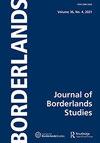Economic Convergence in the Mexico-United States Cross-border Region: A Post-crisis Analysis 2010–2019
IF 1.4
Q2 GEOGRAPHY
引用次数: 0
Abstract
ABSTRACTThis research aims to estimate the σ and β convergence hypotheses for the period following the 2008 crisis (2010–2019) in the states of the Mexico-United States border region. The objective is to determine whether the disparities in per capita income have decreased during that period. Panel and spatial panel methodologies are employed to confirm the β-convergence hypotheses, taking into account heterogeneity, spatial dependence, and the endowment of human capital as conditioning factors. The σ-convergence is estimated using standard deviation. The results indicate the presence of σ-convergence and conditional β-convergence. However, a higher endowment of human capital does not necessarily lead to increased convergence rates due to existing differences between the two economies. In conclusion, there is a need to formulate public policies in Mexico that promote educational attainment among the population residing in the northern border region.KEYWORDS: Human capitalconvergenceregional economic growthpanel dataspatial econometrics Disclosure statementNo potential conflict of interest was reported by the author(s).美墨跨境地区经济趋同:2010-2019年危机后分析
摘要本研究旨在估计2008年危机后(2010-2019年)美墨边境各州的σ和β收敛假设。目的是确定在此期间人均收入的差距是否缩小。在考虑异质性、空间依赖性和人力资本禀赋作为制约因素的情况下,采用面板和空间面板方法验证了β-收敛假设。σ收敛性用标准差估计。结果表明,该模型具有σ收敛性和条件β收敛性。然而,由于两个经济体之间存在的差异,较高的人力资本禀赋并不一定会导致趋同率的提高。最后,墨西哥有必要制定公共政策,促进北部边境地区居民的受教育程度。关键词:人力资本趋同区域经济增长面板数据空间计量经济学披露声明作者未报告潜在利益冲突。
本文章由计算机程序翻译,如有差异,请以英文原文为准。
求助全文
约1分钟内获得全文
求助全文

 求助内容:
求助内容: 应助结果提醒方式:
应助结果提醒方式:


